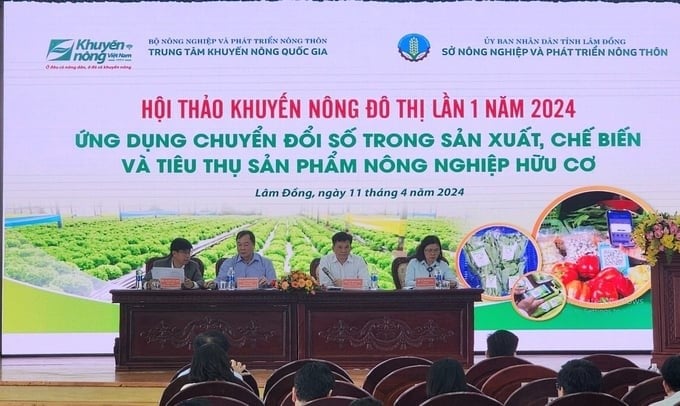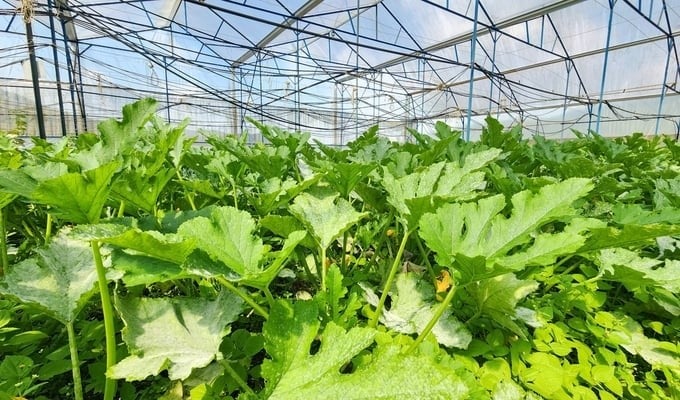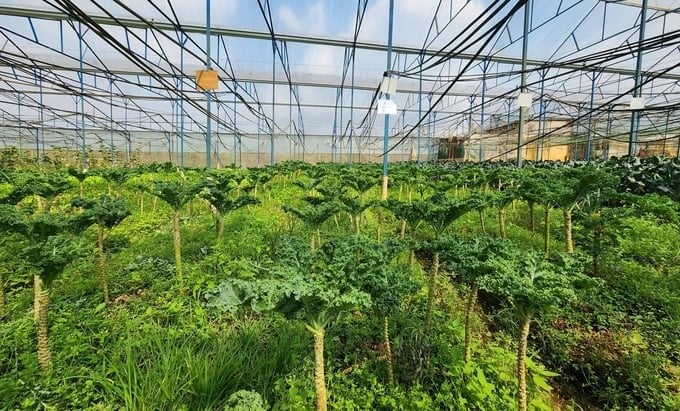May 28, 2025 | 08:00 GMT +7
May 28, 2025 | 08:00 GMT +7
Hotline: 0913.378.918
May 28, 2025 | 08:00 GMT +7
Hotline: 0913.378.918
On April 11, in Da Lat city (Lam Dong), the National Agricultural Extension Center, in collaboration with the Lam Dong Department of Agriculture and Rural Development, organized the 1st urban agricultural extension workshop in 2024 with the theme "Application of Digital Transformation in Production, Processing, and Consumption of Organic Agricultural Products."

The workshop attracted a large number of experts, scientists, state management agencies, etc. to discuss the application of digital technology in organic agriculture. Photo: PC.
Currently, the globally rapid urbanization process has been creating a need to promote agricultural development in urban areas to ensure food security and provide enough food for urban residents. The urbanization process increases pressure on the food supply system in urban areas, especially the demand for fresh, clean fruits and vegetables.
However, agricultural development in urban areas always faces many limitations, such as a lack of arable land, environmental pollution due to emissions, domestic wastewater, traffic, etc. The difference between production conditions in urban areas and traditional agricultural production in rural areas, along with the impacts of climate change, has caused a decrease in productivity, quality of products, and economic efficiency in urban agriculture.
Mr. Do Minh Phuong, Center for Digital Transformation and Agricultural Statistics (Ministry of Agriculture and Rural Development), said that in the context that the 4.0 industrial revolution and trend of digital transformation are occurring strongly, the application of digital technology and artificial intelligence (AI) are considered feasible solutions to help Vietnam's urban agriculture increase product productivity and quality and economic efficiency, aiming for sustainable development.
According to the General Statistics Office's report for 2022, the proportion of agricultural production enterprises applying digital technology in Vietnam has only reached 3.8%. This number shows the great potential of digital transformation in agriculture in general and urban agriculture in particular when new technologies such as IoT, AI, and robotic process automation are applied.
“Therefore, the application of digital transformation and AI has become an urgent requirement to promote the sustainable development of urban agriculture, thereby contributing to ensuring the adequate supply of safe food sources for urban areas of Vietnam," said Mr. Do Minh Phuong.
In Vietnam today, the process of applying digital transformation and AI to the agricultural sector in general and urban agriculture in particular is still limited and not popular. Although there have been a number of high-tech application models in urban agricultural production that have been piloted in big cities such as Ho Chi Minh City and Hanoi, such as hydroponic vegetable growing in smart greenhouses and membrane houses with the application of sensor and automatic control systems, the scale is still small and fragmented.
The application of Internet of Things (IoT) technology to automate irrigation systems and monitor and control environmental factors, such as temperature and humidity, in urban agricultural production models has not yet been widely implemented.

There are a few high-tech application models, such as smart greenhouses, automatic irrigation, robot use, big data analysis, and AI for decision support. Photo: PC.
Ms. Vu Thi Huong, Head of the Urban Agricultural Extension Club and Director of the Hanoi City Agricultural Extension Center, said that many localities are now actively promoting digital transformation in agriculture to improve productivity, increase product value, protect the environment, reduce dependence on the environment and weather, and control harmful organisms in production. The digital transformation in agriculture in localities initially achieved positive results but still has many difficulties and obstacles that need to be resolved.
“The awareness of most businesses, production facilities, and especially farmers about digital transformation is still limited, even among some officials in the agricultural sector. The application of information technology by businesses and production facilities has largely not met the needs of digital transformation.
Besides, the infrastructure for developing and applying new technologies is not synchronous, and the agricultural and rural infrastructure systems do not meet the requirements of agricultural modernization. The quality of human resources with a high speciality in producing and processing agricultural products and knowing how to use and operate equipment (automatic, digital, analytical equipment, etc.) is still limited," said Ms. Vu Thi Huong.
Reality shows that the majority of urban agricultural production households in Vietnam today are still applying traditional production methods with low technology and heavy reliance on manual labor. There are still very few high-tech application models such as smart greenhouses, automatic irrigation, robot use, big data analysis, and AI for decision support.

Building a traceability system for agricultural products using blockchain technology is being targeted. Photo: PC.
To solve the difficulties, at the workshop, delegates jointly discussed and proposed solutions for the coming time. First of all, it is necessary to develop high-tech urban agricultural production models based on the application of advanced digital transformation and AI technologies.
Specifically, build smart greenhouse models for vegetable and fruit production using IoT technology to automatically control input factors such as temperature, light, and humidity, water, and fertilize through an intelligent sensor and control system. Apply AI and Big Data to monitor, analyze, and optimize crop growth conditions while also detecting early signs of abnormalities for timely handling.
In addition, implement an automatic irrigation and fertilization model based on the IoT control system combined with AI algorithms to calculate and adjust the amount of water and fertilizer needed for each crop and different growth stages. Thereby, helping to save water and fertilizer resources and optimize irrigation and fertilization to improve productivity.
At the same time, build a traceability system for agricultural products using blockchain technology in pilot models and organic food production and supply chains in urban areas.
At the workshop, delegates agreed to set a roadmap for the 2023–2025 period, focusing on promulgating projects, research programs, and experimental implementation of digital transformation and AI application solutions in urban agriculture; and forming pilot models of high-tech vegetable, flower, and fruit production in smart greenhouses and membrane houses in big cities.
Translated by Thu Huyen
/2025/05/25/4127-3-073637_820.jpg)
(VAN) Thanks to the promotion from an FAO-implemented project, vegetable production in greenhouses in Moc Chau has seen strong development, from 1.5 hectares in 2021 to nearly 50 hectares in 2024.

(VAN) FAO has recently supported USD 140,000 to implement the project 'Risk mitigation human-animal interface risks through disease control initiatives in pig farming.'

(VAN) The People's Committee of Tra Vinh province has approved an adjustment to the investment policy for the Green Hydrogen Plant project, increasing its area to approximately 52.76 hectares.
![Reducing emissions from rice fields: [2] Farmers’ commitment to the soil](https://t.ex-cdn.com/nongnghiepmoitruong.vn/608w/files/news/2025/05/05/dsc08881jpg-nongnghiep-140632.jpg)
(VAN) Clean rice cultivation model in Thuong Tan commune, Bac Tan Uyen district, is assisting local residents in achieving sustainable agriculture by substantially reducing costs, increasing productivity, and protecting the environment.

(VAN) At the conference to disseminate Resolution No. 68, AgriS introduced its digital agricultural ecosystem and reaffirmed its commitment to accompanying the Government in promoting private sector development and sustainable agriculture.

(VAN) 'Blue Ocean - Blue Foods' initiative is designed to restore marine ecosystems and establish sustainable livelihoods for local communities by cultivating a minimum of 1,000 hectares of cottonii seaweed in the first three years.
/2025/05/21/4642-3-112707_603.jpg)
(VAN) The V-SCOPE project has made direct contributions to three out of six pillars of the Comprehensive Strategic Partnership between Vietnam and Australia.